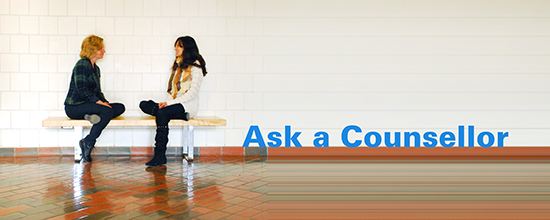
Counselling: Time between appointments
Question: It seems almost impossible to get an appointment with a consistent counsellor in a timely manner. Appointments every 1-1 1/2 months seems like an excessive time to wait. What is being done to lessen the wait time for students?
I’ve had to wait over a month to see my regular counsellor. I was doing well till I couldn’t see her on a regular basis anymore. My mental health has been declining very rapidly since I last saw her. Will MRU be hiring more counsellors? When will the problem of excessive appointment wait times be fixed?
Your questions about Student Counselling capacity to serve MRU students is an ongoing concern for us. We are always reviewing demands and our resource and try to discover the best way to manage these. For example, we have instituted walk-ins to allow for timely access, and this has helped students to get in close to the time they feel the need to connect with a counsellor. It has also resulted in fewer empty appointment spots. When students don’t show for their appointment, we are able to move those attending walk-in afternoons, into these openings. However, the problem you are identifying is the long wait between appointments for ongoing counselling.
First, I want to say that I am sorry to hear your mental health deteriorated between your sessions. Although it is possible for students to see their own counsellor when the counsellor is doing the walk-in blocks (this would be for briefer check-ins) not all counsellors do these walk-in sessions. So perhaps this was the case for your counsellor and it is not ideal, as you point out, to then see a different counsellor. I hope you will discuss this issue of timing of appointments with your counsellor so that you can look at additional options and problem solve around this issue.
For example, an excellent option between appointments are groups and workshops. We are increasing the number of ongoing support groups in order to meet the increasing demand. Some students initially resist this but I can tell you that many students get more benefit from being part of an ongoing counsellor-led support group in between sessions, than they would get from working more frequently with their counsellor one-on-one. We have a group for Indigenous women, one for students on the Autism Spectrum, and two groups going for students struggling with anxiety. Learning together about mental health issues, building skills and improving resilience, mutual support, and feeling less alone are some of the potential outcomes from joining such a group. More will be developed as students learn about the benefit of support groups and agree to attend, and next year there will be an exciting new resilience building program for struggling students that is being led by the Office of Student Success and that will include counsellors and learning strategists.
Another consideration is that we are a brief counselling service. Sometimes students indicate their doctor recommended weekly sessions, and we are unable to meet this demand. In this case it is important to discuss other options in the community. The student and counsellor can work this out. We will continue to support this student until they are connected with the right resource. Students may also be referred to the mental health nurses to help them access additional resources.
In terms of our resources, they have been challenged for various reasons. However, I’m happy to report we have been trying to hire all semester and recently found a successful candidate. So I’ll announce here that Jennifer Hoy is joining our team part-time. However, we also recently learned that one of our counsellors has decided to retire in December. We are happy for her and will celebrate such milestones. It also means we are again searching for Registered Psychologist or Registered Social Workers (spread the word!).
I thank you for your question. I hope that it clarified some challenges and that it encourages others to talk to their counsellor about what is and is not working for them in counselling. I would be happy to meet with anyone in person as well, to hear how our service could be improved, within the limits of our resources. The demand for counselling is unlikely to go down and our resources are unlikely to increase. We recognize that more frequent follow ups between appointments is important for many students. So we will continue to consult students, look at how other universities are handling the demand, and do the best we can with the resources we have both on and off-campus.
All the best,
Mirjam Knapik, Ph.D., R. Psych.
